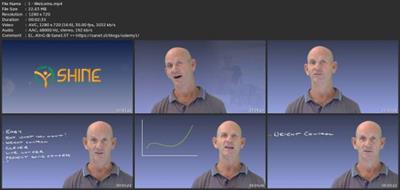O
0

Last updated 5/2017
MP4 | Video: h264, 1280x720 | Audio: AAC, 44.1 KHz
Language: English | Size: 1.09 GB | Duration: 1h 32m
Intermittent fasting has been practised by humans for millennia - scientist now understand the true health benefits.
MP4 | Video: h264, 1280x720 | Audio: AAC, 44.1 KHz
Language: English | Size: 1.09 GB | Duration: 1h 32m
Intermittent fasting has been practised by humans for millennia - scientist now understand the true health benefits.
What you'll learn
Understand the mechanisms of how intermittent fasting works and why it has such enormous health benefits
Know how to effectively implement IF - to understand the different strategies and frequencies
Requirements
A basic interest in food and nutrition
A basic knowledge about human physiology - basic is fine.
There are some in depth sections on the science and physiological adaptations to Intermittent Fasting. Student should be comfortable with some of the technical aspects
Description
In this course we will take a close look at fasting and the evolutionary adaptations, humans and many other species have made to counter the effects of reduced calorie intake. We will also look at the history of fasting and some of the greatest minds who used fasting for health, energy and mental clarity.
Our eating habits are exactly that - habits. What and how we eat is a behaviour - the same as many of the other behaviours we have that make us - US.
Many of our habits we are totally ok with - they don't invoke any feelings of guilt or anxiety. Some of our habits are truly beneficial and we should feel proud we have made them a habit...
One of the trickiest habits or behaviours we own, relates to food. That's because our eating behaviour is shaped by so many emotions,desires and feelings... both good and bad.It is interesting that humans are pretty much the only animal on the planet that don't really know what we are meant to be eating. What is human food. A panda bear has no question that it's primary preferred food source is bamboo shoots. A lion or leopard knows that a zebra, gazelle or wildebeest are perfect food - we are not entirely sure if they actually have a preference. White sharks definitely fancy the taste of seals.So why are humans so confused.Well there are a couple of reasons. Firstly we are the great colonisers - there's hardly a space on the planet we haven't managed to colonise and survive - we had to adapt to whatever foods were available.
There are very few of us in the western world who have experienced what it is like to be truly hungry. And quite right - it is sad that any human beings in this day and age should have to experience hunger.
Having said that, we have, as a species over the course of evolution, experienced hunger, sometimes for extended periods.
What is amazing is that our bodies and minds have become stronger, more resilient, and even shown signs of increased cognitive brain function, boosted immune function and general overall health as a result of forced or voluntary calorie restriction for periods of time.
This course covers intermittent fasting - the history, the great minds who have fasted but mainly the amazing and scientifically proven benefits to our health and well being - from living longer, brain health, immune system health, inflammation, weight loss and or control - the list goes on.
The course will also go into how to do fasting - the best protocols and frequency.
You will be astounded by just how amazing you feel once you start.
Enjoy...
Overview
Section 1: Welcome
Lecture 1 Welcome
Lecture 2 What you will learn on this course
Lecture 3 A definition of Intermittent fasting
Section 2: The origins of fasting
Lecture 4 the evolutionary significance of fasting
Lecture 5 Famous minds who fasted
Section 3: Some useful basic physiological principles explained
Lecture 6 Homeostasis
Lecture 7 Our energy systems
Lecture 8 Hormesis
Lecture 9 Autophagy
Section 4: So WHY intermittent fast
Lecture 10 The benefits of intermittent fasting
Lecture 11 Longevity or living longer
Lecture 12 Longevity - some of the science behind living longer
Lecture 13 Brain Health
Lecture 14 Cancer prevention and treatment
Lecture 15 Your immune system
Lecture 16 Reducing inflammation
Lecture 17 Heart health
Lecture 18 Eating behaviour
Lecture 19 Getting fit and strong
Lecture 20 Weight control
Section 5: Practical implementation of intermittent fasting
Lecture 21 Methods and Strategies
Lecture 22 Frequency of fasting
Lecture 23 Contraindications - who shouldn't do it
Section 6: A wrap up
Lecture 24 And finally...
Lecture 25 Credits
This course is for anyone interested in health and wellbeing,This course will help anyone who has tried and failed with dieting,This course will help anyone who is interested in living a long and healthy life

Download link
rapidgator.net:
You must reply in thread to view hidden text.
uploadgig.com:
You must reply in thread to view hidden text.
nitroflare.com:
You must reply in thread to view hidden text.
1dl.net:
You must reply in thread to view hidden text.
